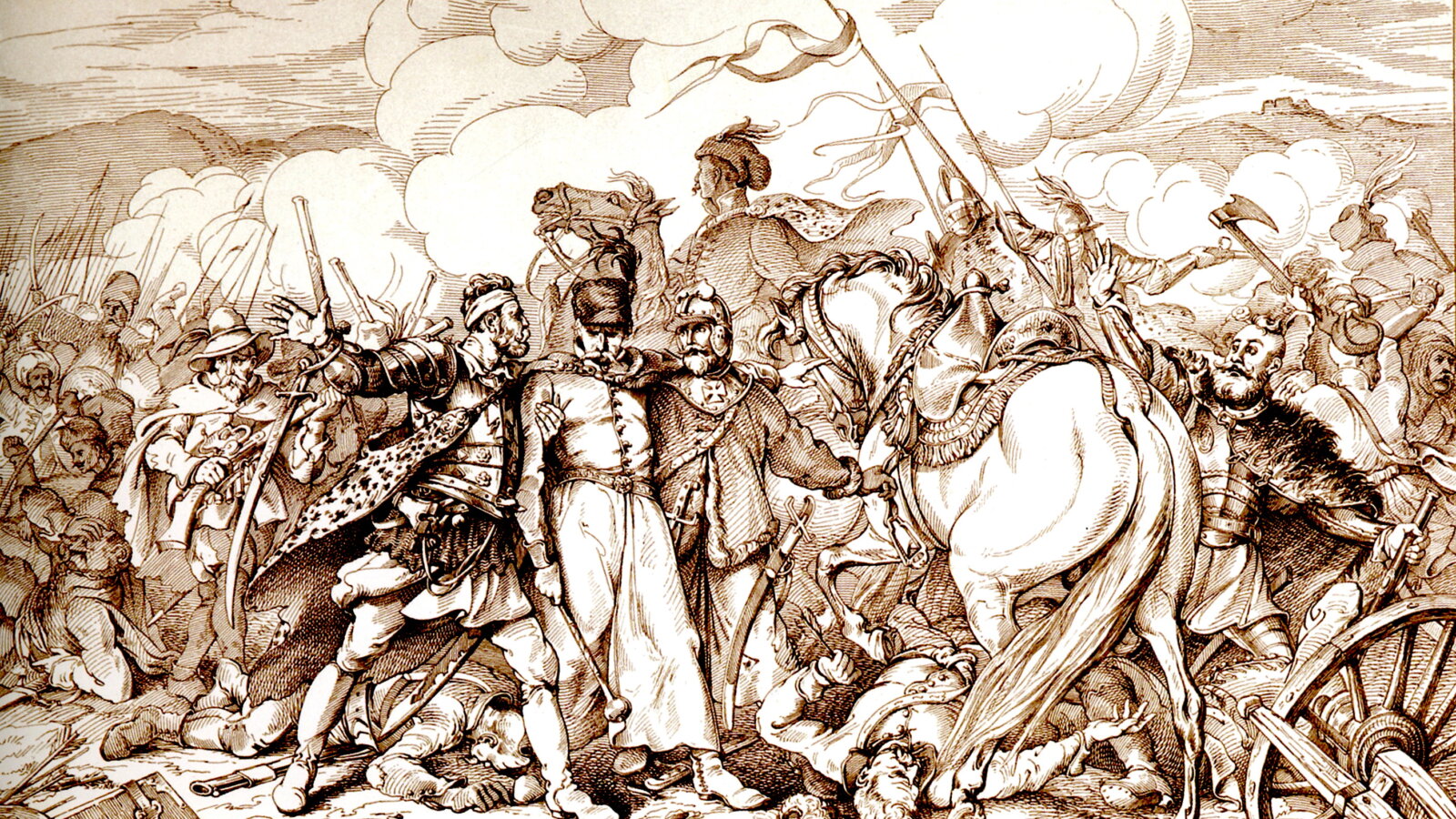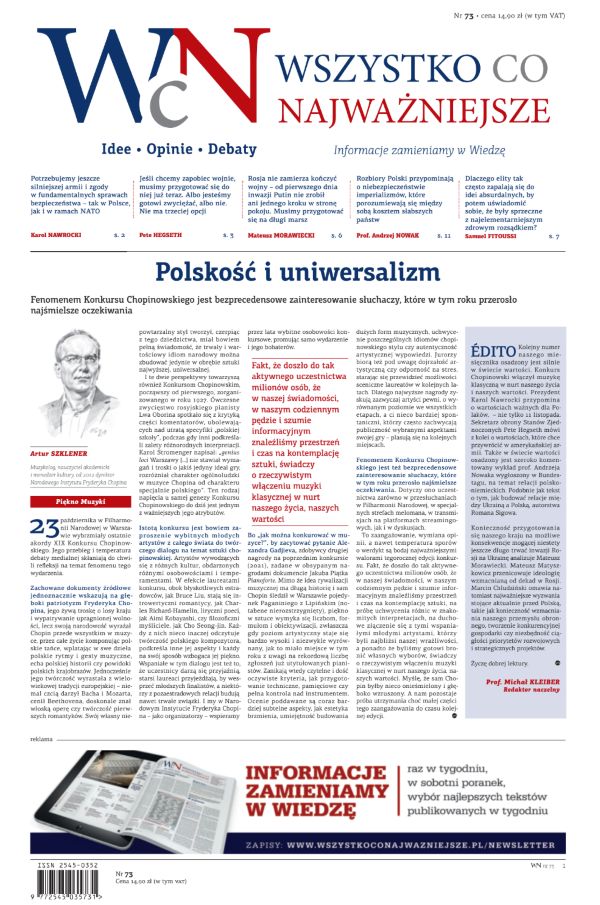
 The Żółkiewski Doctrine – Europe’s Answer to Russian Aggression
The Żółkiewski Doctrine – Europe’s Answer to Russian Aggression
‘Europe has thus reached the point of no return. Russia has no intention of ending the war – from the first day of the invasion Putin has not taken a single step towards peace. We must therefore be prepared for a long road ahead. That is the very purpose of the Żółkiewski Doctrine,’ writes Mateusz MORAWIECKI
.History will remember the night of 9–10 September 2025, when nineteen Russian drones violated Polish airspace. This was no mere incident. It was an act of aggression against Poland, NATO and the entire free world – yet another reminder that Russia’s imperial instincts remain unchanged.
This act cannot pass without consequences. We need an immediate response, but above all a long-term strategy. That is why I am presenting the Żółkiewski Doctrine – a plan for a comprehensive answer to Russian aggression. A plan for Poland, and for all of Europe. For if we act together, the problem of an aggressive Russia can be resolved once and for all.
Understanding the Nature of the Russian Threat
.Unless we first understand how Russia operates, our response will be ineffective. That is why we must take to heart three fundamental truths about Russia.
First, Russia is in thrall to war. Conflict, violence, blackmail and territorial expansion define its very existence. It provokes, infiltrates, subverts and sets societies against each other. It takes one step at a time, stopping only when it hits a wall. Concessions are perceived as a sign of weakness and an invitation to strike.
Second, Russia does not change. In the words of Oscar Wilde, ‘nothing is impossible in Russia but reform.’ From Ivan the Great to Putin, the mechanism of power has been the same: a tyrant on the throne with cowed subjects at his feet. The costumes may be different, but the essence of rule has remained unchanged.
Third, Russia is a state of the secret police. Its strength does not lie in resources but in its gargantuan machinery of control. From the oprichnina and the Okhrana to the NKVD, the KGB and, today, the FSB and the GRU, Russia’s history is the history of its security services. For a quarter of a century, the state has been governed by a former KGB officer who views politics as merely a performance, a game of deception to which the West remains susceptible.
We must therefore recognise that we cannot wait for a miraculous transformation in the Kremlin. Instead, we must communicate with them in the only language they understand: strength. Only then will it retreat, as it did after the defeats of 1856, 1905, 1920 and 1989.
Russian Masks and Europe’s Naïveté
.For centuries Russia has been a lie in which Europe has willingly believed. So it has been from the ‘Potemkin villages’ to the Soviet fiction of a ‘workers’ and peasants’ state’ to the illusions of the 1990s, when Yeltsin – and later a young Putin – were supposedly steering the country towards democracy. Decades of dependence on Russian raw materials swelled the Kremlin’s coffers and strengthened its hand: by buying Russian gas and oil, the West was in effect financing the resurrection of the Russian empire.
Today all of Europe pays the price of that naivety, Ukraine most of all. President Lech Kaczyński warned: ‘Today Georgia, tomorrow Ukraine, the day after tomorrow the Baltic States, and later maybe it will be time for my country, Poland!’ Seventeen years later, that vision is materialising, point by point. Russia has attacked again, this time intentionally, through repeated violations of Polish airspace.
Yet the illusion persists. Three years into the war, Europe’s imports of Russian LNG have reached record levels. In the first half of 2025 the European Union’s gas purchases rose by 29%, reaching €4.48 billion. The EU has given Russia $105.6 billion since February 2022 – that is 75% of the Kremlin’s 2024 defence budget. 87% of that gas was taken in by Spain, France and Belgium, only to be resold, including to Germany. Let it be a sobering reminder for all those who now celebrate Western Europe’s stance, just three and a half years after Chancellor Scholz’s infamous offer of ‘five thousand helmets’ to Kyiv.
The pattern repeats itself with oil. India buys Russia’s crude at knock-down prices, refines it and resells it as its own product. The refinery in Schwedt operates on so-called Kazakh oil pumped through the same Druzhba pipeline that carries Russian crude. Ultimately, it is but a change of labels, with the fuel itself remaining Russian.
Still more dangerous are the loopholes in trade. Brazil, the largest Mercosur member, imports more than $11 billion worth of fuels and fertilisers annually from Russia, subsequently exporting foodstuffs produced with these to Europe. In effect, we are bankrolling Putin’s war in exchange for cheaper imports. Still, Europe is contemplating an agreement that would only deepen this dependence. There is no room for doubt: Mercosur must be stopped.
The stakes in ‘derussifying’ Europe’s economy have never been higher. Donald Trump stated plainly that the United States will only implement real sanctions when NATO completely ends its reliance on Russian raw materials. This is the ultimate test of the West’s credibility.
The Żółkiewski Doctrine: Repelling Russia, Defending Europe
.Europe has thus reached the point of no return. Russia has no intention of ending the war – from the first day of the invasion, Putin has taken not a single step towards peace. We must therefore be prepared for a long road ahead. That is the very purpose of the Żółkiewski Doctrine.[ER1]
Its name is no accident. Hetman Stanisław Żółkiewski proved that Moscow could not only be halted but driven back. In 1610, after his victory at Klushino, he marched with his banners into Moscow, demonstrating that the empire was not invincible. What continues to be a national tragedy for Russians can now be our inspiration.
The point is not, of course, to repeat past expeditions, but something far more important: to push Russia out of Europe’s economic system once and for all. That is the essence of the Żółkiewski Doctrine. Its foundations can be set out in several cardinal principles.
Economic Isolation of Russia
.The primary objective is to completely cut off Russia from the European economy. Poland should unilaterally shut its airspace to Russian passenger and cargo planes. Then demand the same of the European Union. This step would cripple Russian logistics and manufacturing, while signalling no more ‘business as usual.’
Energy is no exception. Poland has already demonstrated that independence is possible – during my government we all but eliminated our reliance on Russian oil and gas. Now it is Europe’s turn to follow the same path. For the fact remains – and I emphasise this with all force – that the mechanisms for circumventing sanctions are still at work: crude from the Druzhba pipeline rebranded as ‘Kazakh,’ Indian refineries reselling Russian oil as their own, and the EU–Mercosur agreement opening a back door for the Kremlin into European markets. Each such contrivance yields profits for intermediaries and hard currency for Russia’s war economy.
Within the European Union we must press for decisive action: extending sanctions to all Russian banks and establishing the principle of confiscating Russian-origin goods imported through third parties. Just days after the war in Ukraine began, I urged the European Council to seize Russian assets and redirect them to the victims of aggression. Yet the wealthy capitals of the West still hesitate. Freezing assets is not enough. At the very least, I called for the interest on frozen bonds to be put to use. Instead, Europe’s elites remain paralysed by fear that such measures might harm the interests of satraps, criminals and dictators whose capital has long flowed into their markets. That is not strategy – it is temporising.
This must end. We must come to the negotiating table with President Trump openly and with confidence. We must be deal-makers. Now is the time to fight for the future, not only for Ukraine but for the entirety of Europe. If we persist in hypocrisy, we shall suffer a double defeat: Ukraine will lose the war, and we shall forfeit our own future.
From Passive to Active Deterrence
.Poland must now move to the next stage of sovereignty. Defence cannot be conceived solely in terms of purchased equipment or allied presence – vital though both remain. We must shift to active deterrence, built on three pillars.
New defensive capabilities. We need a genuinely integrated, multi-layered air defence, protecting not only the armed forces but also cities and critical infrastructure, including airports, power plants and transport hubs. Poland’s Air Shield must fuse advanced systems such as the Patriot with thousands of cheaper sensors, radars and neutralisation assets, from interceptor drones to jammers and conventional artillery. Only then will defence be dense and cost-effective, sparing us the absurdity of shooting down drones with missiles worth millions of dollars apiece. Much of this network can be built in Poland, creating jobs and exportable products.
New offensive capabilities. Poland must possess the means to strike deep into Russian territory. Through cooperation with Ukraine and expansion of our defence industry we can develop long-range cruise missiles and drones. What once seemed beyond reach has been made possible by Ukraine’s example. The modern arms market, increasingly shaped by artificial intelligence, drives down the costs of production and scaling. Poland must seize this opportunity, including with the acquisition of F-35s and other systems designed to penetrate enemy defences.
A culture of strategy. Security must become a shared undertaking of the state and society. We need a unified system of situational awareness, integrating data from all levels – central government, provinces, municipalities and uniformed services. The state cannot operate through paperwork and procedure; it must act in real time. A developed mObywatel platform could serve as both a channel for crisis communication and a tool for rebuilding manpower reserves. Think tanks already propose a model of Universal Public Service, enabling citizens to contribute through the armed forces, civil defence or fire services without returning to conscription. A society prepared for a crisis cannot be cowed – and intimidation is the very foundation of Russia’s strategy.
Polish Production and the Defence Industry
.One of our most urgent tasks is to expand national defence production dramatically – above all in unmanned and anti-drone systems. We must harness the potential of Polish companies engaged in their design and production and reinforce their manufacturing and research capacity with consistent state support. Our engineers, working alongside the Armed Forces and drawing lessons from the Ukrainian front, could develop new systems in Poland at a safe distance from the battlefield. This would provide Ukraine with a more stable supply and give us access to technologies forged directly from priceless battlefield feedback. It is not only a transfer of technology, but a chance to build new partnerships that would enhance our security, yield returns on investment and strengthen innovation in our defence sector.
The pace of development in unmanned systems – aerial, land and naval – is unprecedented. Poland is not without advantages: we have our own experience and competences. But if we wish to enter the technological premier league, we must accelerate. That requires political will, bold investment and the determination of politicians, soldiers, engineers and entrepreneurs alike. Drones are not the future of war; they are its present. Miss this moment, and we surrender the initiative to others.
Agency of the Region
.Lasting security demands that the Three Seas become an actor in its own right. Poland cannot act alone – we need a belt of resilience spanning the Baltic–Black Sea area: from Sweden and Finland in the north, through the Baltic States and the Visegrad Group, to Romania and Turkey, which likewise has no wish to see Russia prevail. This natural north–south axis can serve as the foundation for joint projects in defence, energy and infrastructure.
Essential to this is the creation of genuine financial instruments – such as the Three Seas Fund and the Three Seas Bank – able to finance strategic investments across the region. Without its own capital base, the Intermarium will remain an idea, not an institutionalised force with real impact. At the same time, we must complete Via Baltica and Rail Baltica, expand the regional gas pipeline network on the GIPL model and push forward projects under the banner of military mobility.
But building agency cannot be confined to reaction. In an age of global turbulence we must anticipate events. The world is moving rapidly into a new era of regionalism – macro-regions capable of acting autonomously within the global system. Economic ties are increasingly formed through nearshoring and friendshoring, meaning relocating production closer to allies and shortening supply chains. This could be Poland’s great opportunity.
In such a world the Three Seas initiative will not be merely a regional format, but a new axis of the West – a motor of growth and a pillar of resilience for the entire continent.
Belarus: Between Poland and Russia
.An independent Belarus is a strategic interest for both Poland and Europe. The country’s freedom and prosperity will only be possible once the Lukashenko regime falls, or radically alters its course. Today Minsk grows ever more dependent on Moscow, yet it still clings to vestiges of autonomy. Any form of independence is preferable to its reduction to a Russian province. For Belarus is not Russia – not historically, not culturally, not socially. Our task is to ensure that when the moment of trial comes, Belarusians look to Warsaw rather than to Moscow.
Poland must prepare for three scenarios: full subordination of Minsk to the Kremlin, partial emancipation of the regime or political upheaval. In each case, our support – economic, infrastructural and defensive – will be essential. We must be firm with the regime, yet open to society. Nor should we ignore moments when even an authoritarian Minsk seeks distance from Putin. To close every channel of contact would be to yield the field to Russia.
Turning Belarus towards Poland requires tangible instruments: scholarships and research centres, visa and tax preferences, support for independent media and infrastructure projects ready for the moment of change. Such a network, when the breakthrough comes, will act as a political magnet.
In short, we must hinder Russia’s absorption of Belarus and support every manifestation of Minsk’s resistance. At the same time, we must keep alive the hope that Belarus will win its independence and become a state that strengthens the security between Poland and Russia.
Cybersecurity and the Fight against Disinformation
.Last but not least is cyber-resilience. Russia strikes not only with missiles but also in cyberspace. Poland must build its own ‘cyber dome’ to shield critical infrastructure from infiltration and sabotage. Every institution responsible for national security and the protection of citizens’ data must be able to recruit the best experts. Our Cyber Defence Forces must have the capacity not only to defend effectively but to strike offensively. Nothing deters an adversary more than the certainty that every attack will meet with an immediate and punishing response.
The second pillar is a change of philosophy – cybersecurity by design. Similar to how strict regulations forced banks to implement robust safety measures, providers of other essential services also need to prioritise user safety. We cannot allow a world in which global technology giants leave us to face deepfakes and identity theft alone. Poland has already shown that it can pioneer innovative tools to protect the less cyber-literate. That model must be strengthened and extended.
A social aspect is also necessary. I propose an information reserve for young people that would prepare them to live in the age of information warfare. They would acquire practical skills, such as identifying manipulation, countering propaganda and shaping narratives that bolster communal resilience, in an engaging format drawing on digital culture and gamification. It would be a school of civic responsibility, raising a generation able and ready to defend Poland’s information space.
Strategy, Composure, Solidarity
.The Żółkiewski Doctrine is not merely a set of military or economic prescriptions. Above all it is a new philosophy of security: strategy instead of improvisation, composure instead of panic, solidarity instead of selfishness.
Like every effective doctrine, it rests on systematic action placed beyond the quarrels of day-to-day politics. It is not a matter of grand words but of concrete programmes, procedures and decisions. It is a rulebook, a roadmap for this and every future government in the months and years ahead.
Poland and the Intermarium must break free from the role of passive spectators. We cannot merely react to Moscow’s moves – we must set the pace ourselves. We cannot wait for decisions from Brussels, Berlin or Paris – we must take our own.
We must act now. In just a few years, the fate of Poland and Europe could be sealed for the coming decades. We must make haste to prevent it.



